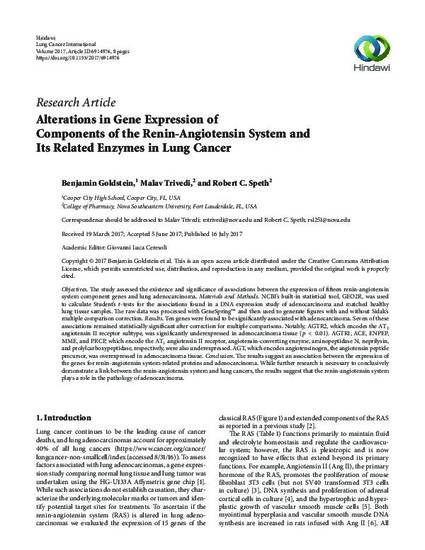
- enzymes,
- gene alteration,
- renin–angiotensin–aldosterone system
Objectives. The study assessed the existence and significance of associations between the expression of fifteen renin-angiotensin system component genes and lung adenocarcinoma. Materials and Methods. NCBI’s built-in statistical tool, GEO2R, was used to calculate Student’s -tests for the associations found in a DNA expression study of adenocarcinoma and matched healthy lung tissue samples. The raw data was processed with GeneSpring™ and then used to generate figures with and without Sidak’s multiple comparison correction. Results. Ten genes were found to be significantly associated with adenocarcinoma. Seven of these associations remained statistically significant after correction for multiple comparisons. Notably, AGTR2, which encodes the AT2 angiotensin II receptor subtype, was significantly underexpressed in adenocarcinoma tissue (). AGTR1, ACE, ENPEP, MME, and PRCP, which encode the AT1 angiotensin II receptor, angiotensin-converting enzyme, aminopeptidase N, neprilysin, and prolylcarboxypeptidase, respectively, were also underexpressed. AGT, which encodes angiotensinogen, the angiotensin peptide precursor, was overexpressed in adenocarcinoma tissue. Conclusion. The results suggest an association between the expression of the genes for renin-angiotensin system-related proteins and adenocarcinoma. While further research is necessary to conclusively demonstrate a link between the renin-angiotensin system and lung cancers, the results suggest that the renin-angiotensin system plays a role in the pathology of adenocarcinoma.
Available at: http://works.bepress.com/robert-speth/30/
